Unit 3 How do you get to achool Section B 教学课件+嵌入音频(共27张PPT)
文档属性
| 名称 | Unit 3 How do you get to achool Section B 教学课件+嵌入音频(共27张PPT) |
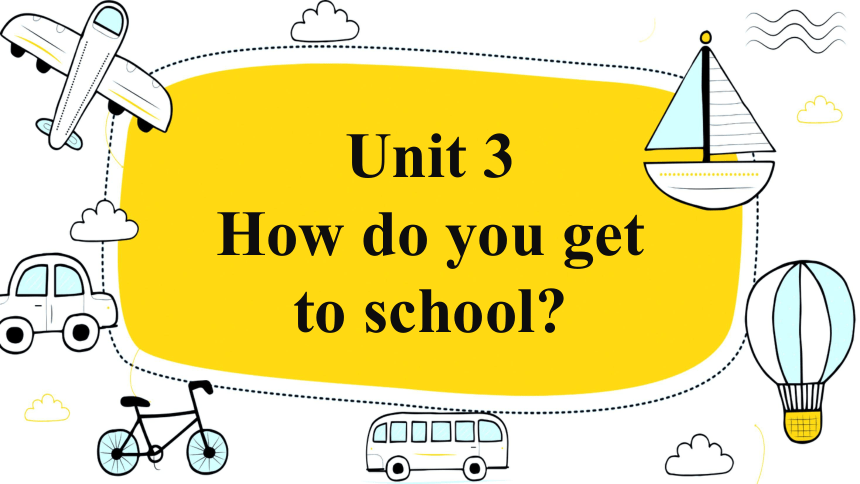
|
|
| 格式 | pptx | ||
| 文件大小 | 3.3MB | ||
| 资源类型 | 教案 | ||
| 版本资源 | 人教新目标(Go for it)版 | ||
| 科目 | 英语 | ||
| 更新时间 | 2023-01-10 00:00:00 | ||
图片预览

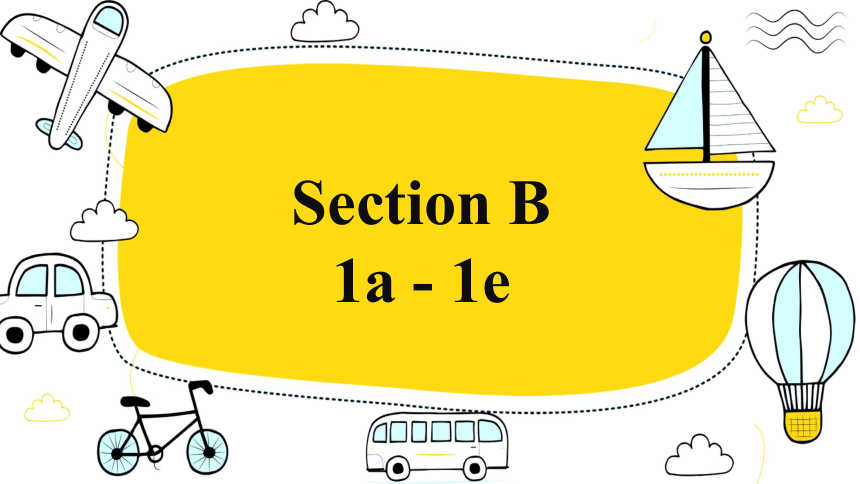

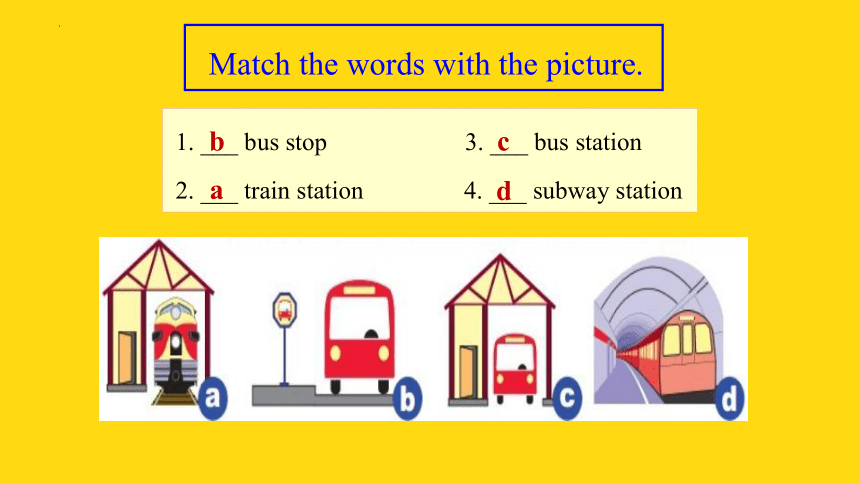
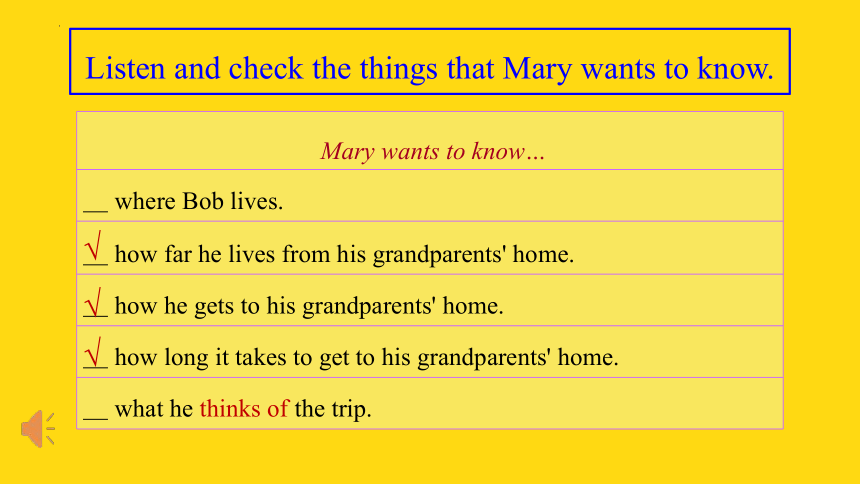
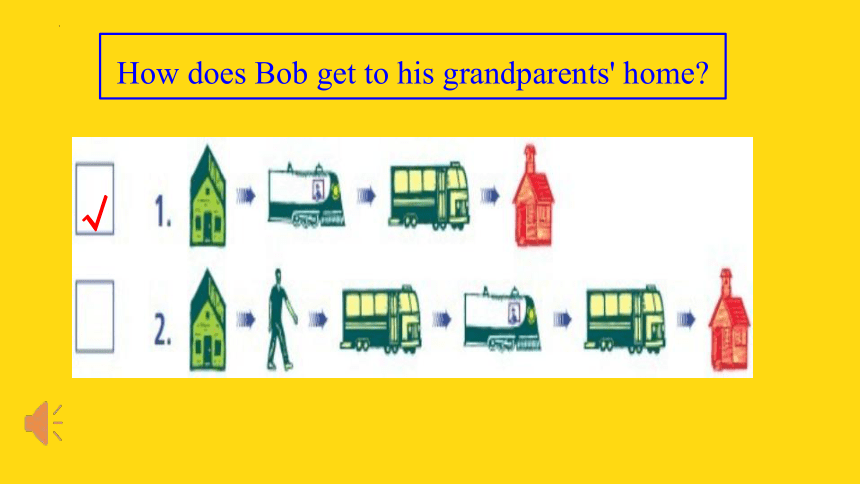
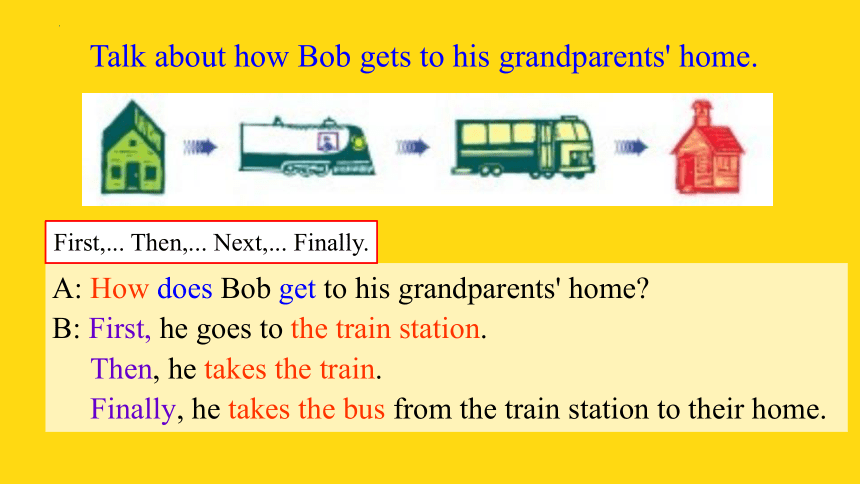


文档简介
(共27张PPT)
Unit 3
How do you get to school
Section B
1a - 1e
bus stop
bus station
subway station
train station
Match the words with the picture.
1. ___ bus stop 3. ___ bus station
2. ___ train station 4. ___ subway station
b
a
d
c
Listen and check the things that Mary wants to know.
Mary wants to know…
_ where Bob lives.
_ how far he lives from his grandparents' home.
_ how he gets to his grandparents' home.
_ how long it takes to get to his grandparents' home.
_ what he thinks of the trip.
√
√
√
How does Bob get to his grandparents' home
√
Talk about how Bob gets to his grandparents' home.
A: How does Bob get to his grandparents' home
B: First, he goes to the train station.
Then, he takes the train.
Finally, he takes the bus from the train station to their home.
First,... Then,... Next,... Finally.
— How + do / does + 主 + get / go to 地点
— 主 + 动词短语 + to + 地点.
= 主 + get / go to + 地点 + 介词短语.
1
2
3
1
2
How do you get home
How do you get to school
— How do you get home
— First, I ride a bike to the bus stop.
Then, I take the bus home / to my home.
— How do you get to school
— First, I walk to the subway station.
Then, I take the subway to school.
First, he walks to the bus stop.
Then, He takes the bus to the train station.
Next, he takes the train.
Finally, he takes the bus from the train station to his aunt's home.
How does Tom get to his aunt's home
First,... Then,... Next,... Finally.
How do you get home
How does Mike get to his brother's home
1
2
1
3
2
3
4
First, I ride a bike to the subway station.
Then, I take the subway.
Next, I walk from the subway station to my home.
I walk home from the subway station.
First, he walks to the bus stop.
Then, he takes the bus to the train station.
Next, he takes the train.
Finally, he takes the subway from the train station to his brother's home.
Section B
2a - 2d
Read the passage and answer the questions.
1. How do the students in the village go to school
They go on a ropeway to cross the river to school.
2. Why do they go to school like this
Because there is no bridge and the river runs too quickly for boats.
3. Does the boy like this school Why
Yes, he does. He loves to play with his classmates. He loves his teacher.
4. What's the villagers' dream
Their dream is to have a bridge.
Do you think their dream can come true Why or why not
1. For many students, it is easy to get to school.
It's + adj. (+ for sb.) + to do sth. (对某人来说)做某事是...的
英语中,动词不定式作主语时, 常用 it 作形式主语放在句子开头, 而将真正的主语(动词不定式)放在后面。
eg. It's difficult for me to finish the work.
It's interesting to join this club.
I like eating many vegetables.
I like eating much chicken.
I like eating lots of vegetables and chicken.
too many & too much 太多
too many books & too much water
much too + adj. 实在太
Kris is much too handsome.
2. One 11-year-old boy, Liangliang, crosses the river every school day.
11-year-old: adj.
eg: He is 11 years old. = He is an 11-year-old boy.
a four-day trip 一次为期四天的旅行
a 30-page book 一本30页的书
3. Girls are afraid of the river.
Girls are afraid to cross the river.
Girls are afraid of crossing the river.
Girls are afraid that they can't cross the river.
get home / there / here 到家 / 这 / 那
bus stop 汽车停靠站 bus / train / subway station 公共汽车/火车/地铁站
think of 认为;想起 think about 考虑
between ... and ... 在…和…之间 be afraid (of) 害怕
too much + 【U】/ too many 【C】太多... much too + adj. 太...
go on a ropeway to cross the river to school 乘坐索道来过河上学
It's + adj. (+ for sb.) + to do sth. 做某事对某人来说是...
It is easy to do sth. 做某事容易 one 11-year-old boy 一个11岁的男孩
be like a(n)... to sb. 对某人来说像… look like 看起来像
come true 实现;成为现实 last e-mail 上一封邮件 thanks for 为...感谢
What + be + 主 + like = What + do / does + 主 + look like
某人的相貌如何
Section B
3a - Self
kilometers get to takes boring walk leave
Hi there,
How are you Thanks for your last e-mail. You want to know how I _______ school, right Well, I usually ______ my home at about 8:00 and _____ to the bus stop. The school bus usually comes at about 8:15. My school is about 20 _________ from my home. It _____ about 40 minutes to get there by bus. The bus ride is never _________ because I always talk to my classmates.
What about you How do you get to school
Tom
get to
leave
walk
kilometers
takes
boring
Write an e-mail to Tom and tell him how you get to school.
1. When do you leave home
2. How do you get to school
3. How far is it from your home to school
4. How long does it take you to get to school
5. Do you like your trip to school
I leave home at ...
First, I walk to the subway station.
Then, I take the subway to school.
It's about...
My school is...from my home.
It takes about ....
It's interesting because...
Dear Tom,
How are you Thank you for your last e-mail. Now let me tell you how I get to school. I usually leave home at half past seven. First, I walk to the subway station. Then I take the subway to school. My school is about ten kilometers from my home. It usually takes me about half an hour to get to school. I usually meet many friends. So my trip is interesting, too.
Name Time How How far How long Feeling
Linda 7:00 10 kilometers 30 minutes
interesting
fun
1. When does Linda leave home
2. How does Linda get to school
3. How far is it from Linda's home to school
4. How long does it take Linda to get to school
5. Does Linda like her trip to school
Name Time How How far How long Feeling
Linda 7:00 10 kilometers 30 minutes
interesting
fun
1. When does Linda leave home
2. How does Linda get to school
3. How far is it from Linda's home to school
4. How long does it take Linda to get to school
5. Does Linda like her trip to school
Let me tell you how Linda gets to school. She usually leaves home at seven o'clock. First, she walks to the bus stop with her friends. Then, she takes the bus to school. Linda's school is about ten kilometers from her home. It usually takes Linda about half an hour to get to school. The bus ride is interesting and fun because she always talk to her friends.
1. He usually goes to his office ___ bus. (介词)
He often gets to the park ___ foot. (介词)
Do you usually walk ___ home every day (介词; /)
2. I often ride a ___ to work. A: train B: taxi C: bike
My sister goes to Beijing by ___. A: train B: a train C: the train
My brother takes ___ to work. A: subway B: the subway C: a subway
3. Mary gets ___ (介词) at seven and then she gets ___ (介词) school by bus.
4. There are six ________ (hundred) students in our school.
5. It takes me fifteen minutes _______ (walk) from my home to the bus station.
6. My school is about 20 ________ (minute) walk from here.
by
on
/
C
A
B
to
up
hundred
to walk
minutes'
take + the / a + 交通工具 + to + 地点
= get / go to + 某地 + by + 交通工具
How do you get home / there / here
I takes the bus home / there / here.
= I get home / there / here by bus.
It takes (sb.) 时间 to do sth.
hundred: 百
one / nine hundred
hundreds of... 数以百计的...
7. Every book ___ (be) very interesting.
8. 翻译: Bob家离学校很远。
Bob's home is very far from his school.
9. What do you think ___ the trip (介词)
Give me an hour to think ______ this plan (计划). (介词)
10. There is a school between the post office ____ the market. (连词)
11. There are too _____ vegetables and too ______ fruit. (many & much)
This dress is ___ long for me. A: too much B: too many C: much too
12. 翻译: 那些在村里的孩子乘坐索道来过河上学。
Those children in the village go on a ropeway to cross the river to school.
is
of
about
many
much
and
C
every + 【C】单 作主语时: 谓语动词用单数
think of 认为
What do / does sb. think of …
think about 考虑(是否可行)
too many + 【C】复 & too much + 【U】 太多
much too + adj. 实在太
13.翻译:完成这项工作对于一个13岁的男孩来说太难了。
It's difficult for a 13-year-old boy to finish this work.
翻译:他只有13岁,完成这项工作对他来说不容易。
He is only 13 years old, and it's not easy for him to finish this work.
14. Thank you ___ your last e-mail. (介词)
15. He looks _____ his grandmother. (介词)
翻译:张老师对我来说像一位妈妈。
Mr. Zhang is like a mother to me.
翻译:你父母长什么样?
What do your parents look like
= What are your parents like
16. 翻译:我相信他们的梦想一定会实现。
I believe their dream must be come true.
for
like
be like a(n)... to sb.
What + be + 主 + like
= What + do / does + 主 + look like
It's + adj. (+ for sb.) + to do sth.
做某事对某人来说是...
Thanks!
Unit 3
How do you get to school
Section B
1a - 1e
bus stop
bus station
subway station
train station
Match the words with the picture.
1. ___ bus stop 3. ___ bus station
2. ___ train station 4. ___ subway station
b
a
d
c
Listen and check the things that Mary wants to know.
Mary wants to know…
_ where Bob lives.
_ how far he lives from his grandparents' home.
_ how he gets to his grandparents' home.
_ how long it takes to get to his grandparents' home.
_ what he thinks of the trip.
√
√
√
How does Bob get to his grandparents' home
√
Talk about how Bob gets to his grandparents' home.
A: How does Bob get to his grandparents' home
B: First, he goes to the train station.
Then, he takes the train.
Finally, he takes the bus from the train station to their home.
First,... Then,... Next,... Finally.
— How + do / does + 主 + get / go to 地点
— 主 + 动词短语 + to + 地点.
= 主 + get / go to + 地点 + 介词短语.
1
2
3
1
2
How do you get home
How do you get to school
— How do you get home
— First, I ride a bike to the bus stop.
Then, I take the bus home / to my home.
— How do you get to school
— First, I walk to the subway station.
Then, I take the subway to school.
First, he walks to the bus stop.
Then, He takes the bus to the train station.
Next, he takes the train.
Finally, he takes the bus from the train station to his aunt's home.
How does Tom get to his aunt's home
First,... Then,... Next,... Finally.
How do you get home
How does Mike get to his brother's home
1
2
1
3
2
3
4
First, I ride a bike to the subway station.
Then, I take the subway.
Next, I walk from the subway station to my home.
I walk home from the subway station.
First, he walks to the bus stop.
Then, he takes the bus to the train station.
Next, he takes the train.
Finally, he takes the subway from the train station to his brother's home.
Section B
2a - 2d
Read the passage and answer the questions.
1. How do the students in the village go to school
They go on a ropeway to cross the river to school.
2. Why do they go to school like this
Because there is no bridge and the river runs too quickly for boats.
3. Does the boy like this school Why
Yes, he does. He loves to play with his classmates. He loves his teacher.
4. What's the villagers' dream
Their dream is to have a bridge.
Do you think their dream can come true Why or why not
1. For many students, it is easy to get to school.
It's + adj. (+ for sb.) + to do sth. (对某人来说)做某事是...的
英语中,动词不定式作主语时, 常用 it 作形式主语放在句子开头, 而将真正的主语(动词不定式)放在后面。
eg. It's difficult for me to finish the work.
It's interesting to join this club.
I like eating many vegetables.
I like eating much chicken.
I like eating lots of vegetables and chicken.
too many & too much 太多
too many books & too much water
much too + adj. 实在太
Kris is much too handsome.
2. One 11-year-old boy, Liangliang, crosses the river every school day.
11-year-old: adj.
eg: He is 11 years old. = He is an 11-year-old boy.
a four-day trip 一次为期四天的旅行
a 30-page book 一本30页的书
3. Girls are afraid of the river.
Girls are afraid to cross the river.
Girls are afraid of crossing the river.
Girls are afraid that they can't cross the river.
get home / there / here 到家 / 这 / 那
bus stop 汽车停靠站 bus / train / subway station 公共汽车/火车/地铁站
think of 认为;想起 think about 考虑
between ... and ... 在…和…之间 be afraid (of) 害怕
too much + 【U】/ too many 【C】太多... much too + adj. 太...
go on a ropeway to cross the river to school 乘坐索道来过河上学
It's + adj. (+ for sb.) + to do sth. 做某事对某人来说是...
It is easy to do sth. 做某事容易 one 11-year-old boy 一个11岁的男孩
be like a(n)... to sb. 对某人来说像… look like 看起来像
come true 实现;成为现实 last e-mail 上一封邮件 thanks for 为...感谢
What + be + 主 + like = What + do / does + 主 + look like
某人的相貌如何
Section B
3a - Self
kilometers get to takes boring walk leave
Hi there,
How are you Thanks for your last e-mail. You want to know how I _______ school, right Well, I usually ______ my home at about 8:00 and _____ to the bus stop. The school bus usually comes at about 8:15. My school is about 20 _________ from my home. It _____ about 40 minutes to get there by bus. The bus ride is never _________ because I always talk to my classmates.
What about you How do you get to school
Tom
get to
leave
walk
kilometers
takes
boring
Write an e-mail to Tom and tell him how you get to school.
1. When do you leave home
2. How do you get to school
3. How far is it from your home to school
4. How long does it take you to get to school
5. Do you like your trip to school
I leave home at ...
First, I walk to the subway station.
Then, I take the subway to school.
It's about...
My school is...from my home.
It takes about ....
It's interesting because...
Dear Tom,
How are you Thank you for your last e-mail. Now let me tell you how I get to school. I usually leave home at half past seven. First, I walk to the subway station. Then I take the subway to school. My school is about ten kilometers from my home. It usually takes me about half an hour to get to school. I usually meet many friends. So my trip is interesting, too.
Name Time How How far How long Feeling
Linda 7:00 10 kilometers 30 minutes
interesting
fun
1. When does Linda leave home
2. How does Linda get to school
3. How far is it from Linda's home to school
4. How long does it take Linda to get to school
5. Does Linda like her trip to school
Name Time How How far How long Feeling
Linda 7:00 10 kilometers 30 minutes
interesting
fun
1. When does Linda leave home
2. How does Linda get to school
3. How far is it from Linda's home to school
4. How long does it take Linda to get to school
5. Does Linda like her trip to school
Let me tell you how Linda gets to school. She usually leaves home at seven o'clock. First, she walks to the bus stop with her friends. Then, she takes the bus to school. Linda's school is about ten kilometers from her home. It usually takes Linda about half an hour to get to school. The bus ride is interesting and fun because she always talk to her friends.
1. He usually goes to his office ___ bus. (介词)
He often gets to the park ___ foot. (介词)
Do you usually walk ___ home every day (介词; /)
2. I often ride a ___ to work. A: train B: taxi C: bike
My sister goes to Beijing by ___. A: train B: a train C: the train
My brother takes ___ to work. A: subway B: the subway C: a subway
3. Mary gets ___ (介词) at seven and then she gets ___ (介词) school by bus.
4. There are six ________ (hundred) students in our school.
5. It takes me fifteen minutes _______ (walk) from my home to the bus station.
6. My school is about 20 ________ (minute) walk from here.
by
on
/
C
A
B
to
up
hundred
to walk
minutes'
take + the / a + 交通工具 + to + 地点
= get / go to + 某地 + by + 交通工具
How do you get home / there / here
I takes the bus home / there / here.
= I get home / there / here by bus.
It takes (sb.) 时间 to do sth.
hundred: 百
one / nine hundred
hundreds of... 数以百计的...
7. Every book ___ (be) very interesting.
8. 翻译: Bob家离学校很远。
Bob's home is very far from his school.
9. What do you think ___ the trip (介词)
Give me an hour to think ______ this plan (计划). (介词)
10. There is a school between the post office ____ the market. (连词)
11. There are too _____ vegetables and too ______ fruit. (many & much)
This dress is ___ long for me. A: too much B: too many C: much too
12. 翻译: 那些在村里的孩子乘坐索道来过河上学。
Those children in the village go on a ropeway to cross the river to school.
is
of
about
many
much
and
C
every + 【C】单 作主语时: 谓语动词用单数
think of 认为
What do / does sb. think of …
think about 考虑(是否可行)
too many + 【C】复 & too much + 【U】 太多
much too + adj. 实在太
13.翻译:完成这项工作对于一个13岁的男孩来说太难了。
It's difficult for a 13-year-old boy to finish this work.
翻译:他只有13岁,完成这项工作对他来说不容易。
He is only 13 years old, and it's not easy for him to finish this work.
14. Thank you ___ your last e-mail. (介词)
15. He looks _____ his grandmother. (介词)
翻译:张老师对我来说像一位妈妈。
Mr. Zhang is like a mother to me.
翻译:你父母长什么样?
What do your parents look like
= What are your parents like
16. 翻译:我相信他们的梦想一定会实现。
I believe their dream must be come true.
for
like
be like a(n)... to sb.
What + be + 主 + like
= What + do / does + 主 + look like
It's + adj. (+ for sb.) + to do sth.
做某事对某人来说是...
Thanks!
同课章节目录
- Unit 1 Can you play the guitar?
- Section A
- Section B
- Unit 2 What time do you go to school?
- Section A
- Section B
- Unit 3 How do you get to school?
- Section A
- Section B
- Unit 4 Don't eat in class.
- Section A
- Section B
- Unit 5 Why do you like pandas?
- Section A
- Section B
- Unit 6 I'm watching TV.
- Section A
- Section B
- Review of Units 1-6
- Unit 7 It's raining!
- Section A
- Section B
- Unit 8 Is there a post office near here?
- Section A
- Section B
- Unit 9 What does he look like?
- Section A
- Section B
- Unit 10 I'd like some noodles.
- Section A
- Section B
- Unit 11 How was your school trip?
- Section A
- Section B
- Unit 12 What did you do last weekend?
- Section A
- Section B
